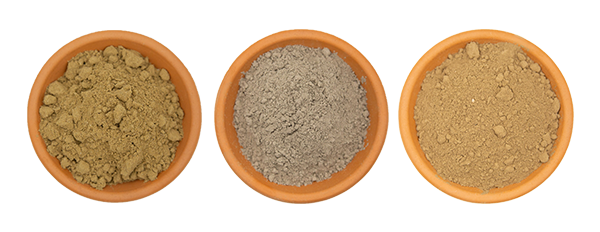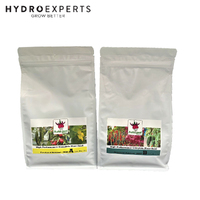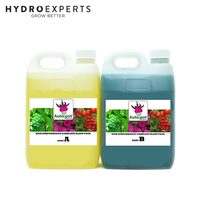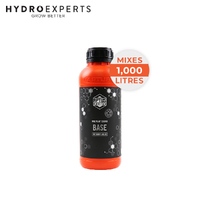No matter the growth medium, certain hydroponic nutrients are needed by all plants. These base elements of your hydroponic fertilizer are critical to the plants’ ability to grow. Such hydro grow nutrients contain a range of well-known minerals, including nitrogen, phosphorus, potassium, calcium, magnesium, iron, manganese, zinc and sulphur. These nutrients are usually listed first on all hydroponic fertilizer products and used across all phases of plant growth.
Hydro Experts stock everything you need to keep your plants healthy, flourishing and resilient!
Hydroponic Base Nutrients by Category
3 Related Content Found

Explore Aptus Feed Programs and Manuals | Hydro Experts Australia

Hydroponic vs organic nutrients: what's the difference?

Why a new brand?
Hydroponic Nutrients
Hydroponic nutrients and traditional soil-based fertilisers are designed to provide plants with essential nutrients for growth. However, their composition, application methods, and effectiveness in promoting plant growth differ. In this short outline, we'll cover some essential attributes of what they are and how they work.
Hydroponic nutrients vs. Soil- Based Fertilisers
Liquid or powdered nutrients are specifically formulated for plants grown in hydroponic systems where plants are grown in a soil-less medium (usually water or an inert growing medium).
They are water-soluble, containing all the essential macro and micronutrients in a readily available form for plants. They can be easily adjusted to meet the needs of specific plant species.
On the other end of the scale, traditional soil-based fertilisers are designed for plants grown in living soils. They are available in organic and inorganic forms and can be granular, liquid, or slow-release.
Soil-based fertilisers contain essential nutrients but may not be as precisely balanced as hydroponic nutrients. Microorganisms must break down the nutrients in soil-based fertilisers before they become available to plants, which can take time.
Why is this important?
Nutrient deficiencies can be corrected more quickly with hydroponic nutrients than traditional soil-based fertilisers, primarily due to plants' direct access to the nutrients and the ease of adjusting the nutrient solution.
In a hydroponic system, nutrient deficiencies can be identified by observing the plants' growth, leaf colour, and overall health or by analysing the nutrient solution. Once a deficiency is diagnosed, the nutrient solution can be adjusted to provide the appropriate levels of the missing nutrients.
Composition:
Liquid hydroponic nutrients:
- These are water-soluble nutrient solutions specifically formulated for plants grown in hydroponic systems. They contain a balanced mix of essential macro and micronutrients, such as nitrogen (N), phosphorus (P), potassium (K), calcium (Ca), magnesium (Mg), sulphur (S), iron (Fe), manganese (Mn), and other trace elements. The nutrients are highly concentrated and immediately available to the plants as they are dissolved in water.
Traditional soil-based fertilisers:
- These are typically granular or powdered materials mixed with soil to provide plant nutrients. They can be organic (derived from plant or animal sources) or inorganic (synthetically produced). The nutrient composition varies depending on the fertiliser type. The nutrients may take time to be available to the plants, as soil microbes or other processes must break them down.
Application Methods
Since hydroponic systems lack soil, nutrients must be delivered directly to the plant roots via the nutrient solution. This solution is typically circulated through the hydroponic system, allowing plants to absorb nutrients as needed. This also applies to top feed systems like hand watering plants grown in coco & perlite mixes
Another benefit is nutrient concentrations and pH of the solution can be closely monitored and adjusted to optimise plant growth. In contrast, Soil-based fertilisers are applied directly to the soil by top-dressing or mixing with the planting medium. They are typically used at specific intervals during the growing season or as a slow-release formula that breaks down over time.
Effectiveness in Promoting Plant Growth
Hydroponic systems can promote faster plant growth, and higher yields than soil-based systems as plants have direct access to all the essential nutrients in a readily available form, and environmental conditions can be tightly controlled. In addition, hydroponic systems can prevent issues related to soil-borne diseases, pests, and nutrient imbalances.
Soil-based fertilisers can also effectively promote plant growth, but the rate of nutrient uptake can be slower due to the dependence on soil microorganisms to break down the nutrients. Additionally, soil-based systems can be more susceptible to nutrient imbalances, pests, diseases, and environmental factors that can negatively impact plant growth.















































